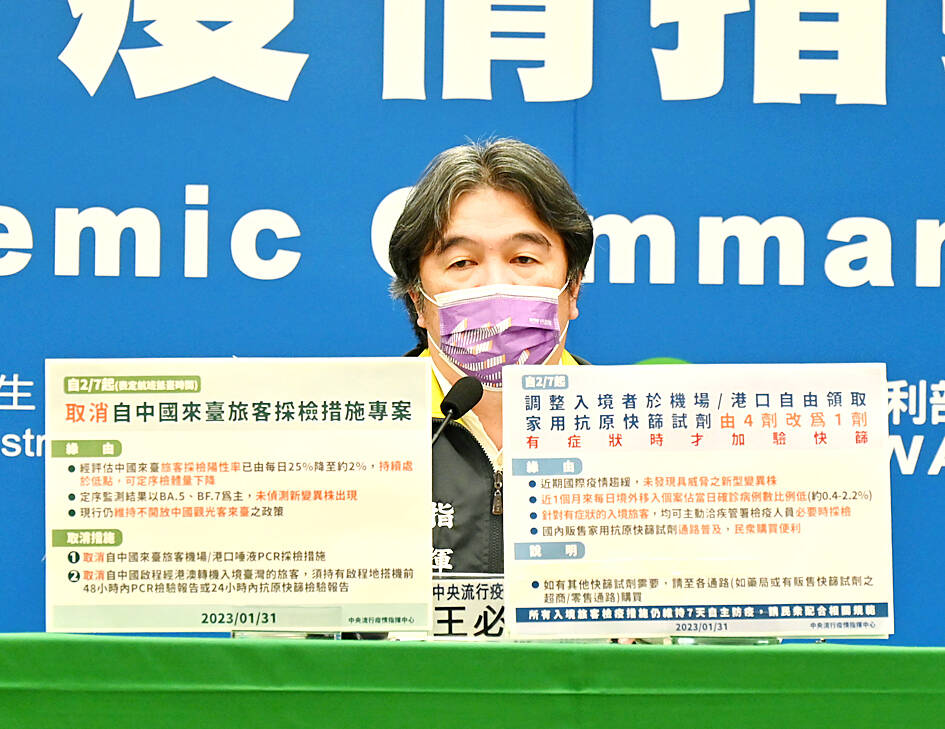The COVID-19 testing requirement for travelers from China is to be lifted from Tuesday next week and the testing guidelines for all inbound international travelers during the self-disease prevention period is to be eased to only taking an at-home rapid test when symptoms occur, the Central Epidemic Command Center (CECC) announced yesterday.
Shortly after former vice president Chen Chien-jen (陳建仁) took over as the new premier yesterday morning, he visited the CECC to learn about its COVID-19 surveillance and response operations.
Chen said the world now has better control over the COVID-19 situation and the number of new infections is falling, and that the CECC would continue to monitor the outbreak in China, so he and CECC officials discussed easing masking rules and border control measures.

Photo: Wang Yi-sung, Taipei Times
Deputy Minister of Health and Welfare Victor Wang (王必勝), who heads the CECC, announced that starting from Tuesday next week, the testing requirement for travelers from China — either on direct flights from four major cities in China or through the special direct travel program between China and Taiwan’s outlying islands of Kinmen and Matsu — would be removed.
The pre-departure negative test result requirement for travelers from China transiting through Macau or Hong Kong is also to be lifted from Tuesday next week, he said.
Wang said the reasons for removing the testing requirement include that the positivity rate of travelers from China had dropped, from more than 20 percent when the program started on Jan. 1 to an average of about 2 percent last week.
While conducting genomic sequencing for detecting possible new high-risk variants was the main purpose of the testing program, the decline in the number of positive cases leads to fewer samples for genomic sequencing, he said, adding that no new dangerous variant had been detected and the vast majority of travelers who tested positive had the Omicron BA.5 or BF.7 subvariants of SARS-CoV-2.
Wang said the requirement that all inbound travelers are required to take a rapid test every two days if they go out during the seven-day self-disease prevention period after arriving in Taiwan would also end on Tuesday next week and they would only need to take a rapid test if they develop symptoms.
Following the revised testing guidelines, the free at-home rapid test kits offered to inbound travelers at airports and harbors would be reduced from four kits to one kit, for use when symptoms occur, and they can purchase more test kits at pharmacies if needed, he said.
Wang said the revision was made because no new variant of concern had been detected and imported cases only accounted for about 0.4 to 2.2 percent of new daily cases in Taiwan.
Airport quarantine stations would continue to screen for travelers with symptoms, he said.
As further easing the masking rules would affect many aspects of people’s daily lives, the plan was to be discussed at a Cabinet meeting yesterday and the CECC would publicize the plan later this week.
Taiwan yesterday reported 32,023 new domestic COVID-19 cases — an increase of 118 percent compared with the same day last week — 264 imported cases and 32 deaths.

AGING: As of last month, people aged 65 or older accounted for 20.06 percent of the total population and the number of couples who got married fell by 18,685 from 2024 Taiwan has surpassed South Korea as the country least willing to have children, with an annual crude birthrate of 4.62 per 1,000 people, Ministry of the Interior data showed yesterday. The nation was previously ranked the second-lowest country in terms of total fertility rate, or the average number of children a woman has in her lifetime. However, South Korea’s fertility rate began to recover from 2023, with total fertility rate rising from 0.72 and estimated to reach 0.82 to 0.85 by last year, and the crude birthrate projected at 6.7 per 1,000 people. Japan’s crude birthrate was projected to fall below six,

Conflict with Taiwan could leave China with “massive economic disruption, catastrophic military losses, significant social unrest, and devastating sanctions,” a US think tank said in a report released on Monday. The German Marshall Fund released a report titled If China Attacks Taiwan: The Consequences for China of “Minor Conflict” and “Major War” Scenarios. The report details the “massive” economic, military, social and international costs to China in the event of a minor conflict or major war with Taiwan, estimating that the Chinese People’s Liberation Army (PLA) could sustain losses of more than half of its active-duty ground forces, including 100,000 troops. Understanding Chinese

US President Donald Trump in an interview with the New York Times published on Thursday said that “it’s up to” Chinese President Xi Jinping (習近平) what China does on Taiwan, but that he would be “very unhappy” with a change in the “status quo.” “He [Xi] considers it to be a part of China, and that’s up to him what he’s going to be doing, but I’ve expressed to him that I would be very unhappy if he did that, and I don’t think he’ll do that. I hope he doesn’t do that,” Trump said. Trump made the comments in the context

SELF-DEFENSE: Tokyo has accelerated its spending goal and its defense minister said the nation needs to discuss whether it should develop nuclear-powered submarines China is ramping up objections to what it sees as Japan’s desire to acquire nuclear weapons, despite Tokyo’s longstanding renunciation of such arms, deepening another fissure in the two neighbors’ increasingly tense ties. In what appears to be a concerted effort, China’s foreign and defense ministries issued statements on Thursday condemning alleged remilitarism efforts by Tokyo. The remarks came as two of the country’s top think tanks jointly issued a 29-page report framing actions by “right-wing forces” in Japan as posing a “serious threat” to world peace. While that report did not define “right-wing forces,” the Chinese Ministry of Foreign Affairs was